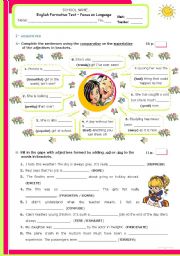Tag Questions Exercises Upper Intermediate English Reading
Question Tags Exercise. Fun exercises to improve your English. Grammar, Vocabulary, Reading. Home Page >> Grammar Exercises >> Pre-Intermediate >> Question.
- Upper Intermediate Reading Comprehension
- Upper Intermediate English Exercises
- Upper Intermediate English Test Pdf
Poor Best Details Parent Category: Category: Written by Chris Cotter What is a tag question? A tag question (or question tag in British English) is a structure used to confirm a statement via a short question at the end of the sentence. You speak English, don't you? He will visit Argentina next month, won't he? What is the sentence structure? The sentence structure is as follows: positive statement negative tag question Harold found a new job didn't he?
You studied Italian didn't you? Negative statement positive question tag Most people in your company couldn't get a raise could they? Jennifer won't be able graduate next spring will she? The statement and the tag question have the same verb tense and the same modal verb (if used). With an action verb (find, study, etc), the tag question uses the auxiliary 'do.' In addition, the personal pronoun in the tag matches the subject of the sentence. Look at the following: You are happy, aren't you?
He is rich, isn't he? Karen wasn't able to go to work, was she? They visited New York, didn't they?

Bill will graduate next spring, won't he? Sandy must study for the test, mustn't she? They could vote in the primary, couldn't they? How are tag questions used? Tag questions infrequently appear in writing. When used, the speaker believes himself to be correct, but wants to confirm the information. The tag functions as a question.
For example: You got a haircut, didn't you? = It looks like you got a haircut. Did you get one? You hate your job, don't you?
= I think you hate your job. Do you hate it? Tag questions can also emphasize a commonly held belief.
In this case, the tag functions like a statement. For example: Our boss doesn't know what to do, does he? = Our boss is so clueless, everyone must agree.
This movie is really boring, isn't it? = This movie is so boring, everyone must agree. Lastly, when answering a tag question, the answer should reflect the truth of the situation. It shouldn't necessarily answer the question. Look at the following example: Q: Bill Gates is the richest man in the world, isn't he? A: Yes, he is (the richest man in the world). Q: Bill Gates isn't the richest man in the world, is he?
Upper Intermediate Reading Comprehension
A: Yes, he is (the richest man in the world). In both cases, the reply is 'yes' in order to correctly answer to the situation. Is there additional information on tag questions?

Upper Intermediate English Exercises
First, intonation plays an important role with tag questions. When confirming information, the speaker uses the tag as a question, and so his voice rises as with a usual yes/no question. However, when adding emphasis, the tag isn't a question because the speaker is already sure of the information. It uses the same intonation as a simple statement with falling intonation.
In addition, British English and American English require a different tag with has. Look at the following: British English: He has a lot of money, hasn't he? American English: He has a lot of money, doesn't he?
Put in the correct question tags for each sentence. John smokes a lot,?
My mother has lovely hair,? You do like this film we're watching,?
He can't speak English very well,? Your brother isn't married,?
Upper Intermediate English Test Pdf
She doesn't cook very well,? We can go to the cinema tomorrow if you want,? They don't have a very nice house,? She is the richest woman in the town,? We should leave before it gets dark,? You'd like a cup of tea,?

They mustn't go too near the lake,? You'll see John tomorrow,? We won't be going to that restaurant again,? Let's try and phone her again,? You've seen this film already,? Your uncle has never been out of the village,?
You're seeing Amy next week,? I'm not speaking first at the meeting,? This was an interesting exercise,?